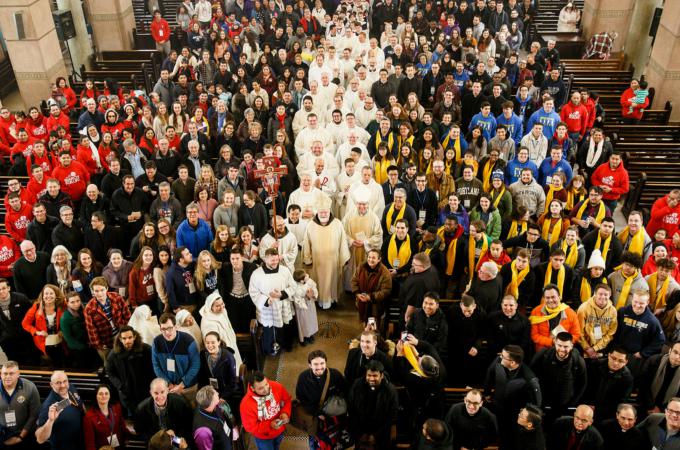Save babies by accompanying mothers, cardinal tells Boston pro-life pilgrims
WASHINGTON, D.C. -- Before participating in the 74th annual March for Life, Cardinal Seán P. O'Malley gathered with pilgrims from the Archdiocese of Boston on the morning of Jan. 24 for a special Mass at Sacred Heart Shrine in Washington, D.C.
Cardinal O'Malley has a special connection with the shrine, which is run by his order, the Capuchin friars. Early in his priesthood, he was assigned there for many years and ministered to the Hispanic and Haitian communities there.
In his homily, Cardinal O'Malley noted that he has participated in every March for Life since its inception in 1974, one year after the Supreme Court case Roe v. Wade effectively legalized abortion in the United States.
The cardinal said that, in its early years, people thought the March for Life would not continue as its participants grew older and died.
"It's so consoling to see that every year, more and more young people are becoming involved in the pro-life movement. This is a great sign of hope and witness to the world," he told the Mass attendees, many of whom were high school and college students.
Cardinal O'Malley spoke at length about the Gospel of Life, which he called "the center piece of the Church's social teaching."
"The Church's pro-life message is a great service to all society," he said.
He emphasized the necessity of accompanying women in crisis pregnancies.
"The pro-life movement needs to be the merciful face of God to women facing a difficult pregnancy," he said.
He pointed to the example of how Jesus treats the woman caught in adultery.
"Jesus does not condone the woman's fall, but he does not condemn her. He invites her to make a new start, to know that she is forgiven and loved. Pope Francis urges us to practice 'the art of accompaniment,' which teaches us to remove our sandals before the sacred ground of the other, in this case, the woman in crisis. This accompaniment must be steady and reassuring," Cardinal O'Malley said.
He noted that pro-life ministries, such as the Sisters of Life and Project Rachel, offer exactly that kind of accompaniment.
"As believers and members of Christ's family, we want to save the thousands of innocent children who are being executed by the very people whose profession and mission should be to heal and protect life. The truth is that we can save those babies only by saving the mothers," the cardinal said.
"When they experience God's loving mercy in a community that cares about them, then they will become capable of showing mercy to their children. The pro-life movement has to be about saving mothers. We need to focus on the women to try to understand what they are suffering," he added.
Cardinal O'Malley also spoke about Dr. Bernard Nathanson, the late obstetrician-gynecologist who co-founded NARAL (then the National Association for the Repeal of Abortion Laws; today the National Abortion Rights Action League). Nathanson was a leading advocate and practitioner of abortion, but he eventually embraced the pro-life cause and joined the Catholic Church, becoming "the most eloquent opponent of abortion and the abortion industry."
"God's grace turned Saul of Tarsus, the implacable persecutor of the Church, into the Apostle of the Gentiles; and that grace transformed Bernard Nathanson, the founder of NARAL, into an apostle of the Gospel of Life," Cardinal O'Malley said.
He recalled how the legalization of abortion prompted calls for "Adoption, not abortion," but noted that adoption rates have fallen, while there are over 1 million abortions performed annually.
He said that people need to hear "the good stories of adoptions, of courageous birth mothers and generous adoptive families that have truly provided a loving family for an adopted child."
Cardinal O'Malley also spoke of the need to alleviate poverty, which is a major factor in driving women to seek abortion. He said that unborn babies can be rescued from abortion if their mothers are rescued from lives of poverty.
"It is our task to witness to the truth that love, compassion and solidarity can build a just society that will be safer for the poor, the unborn and those on the periphery," he said.



















